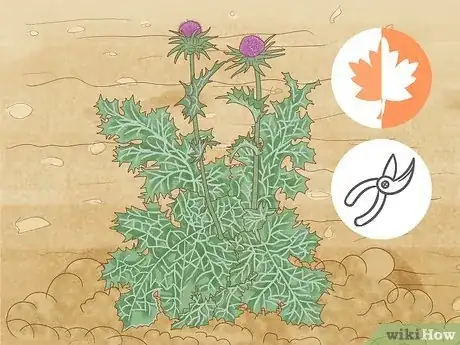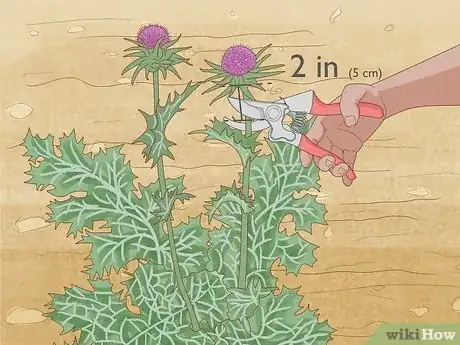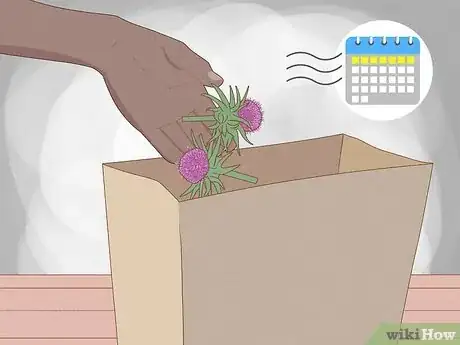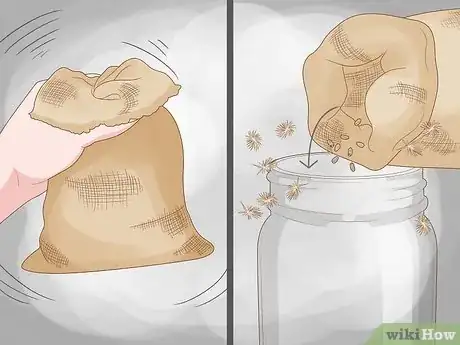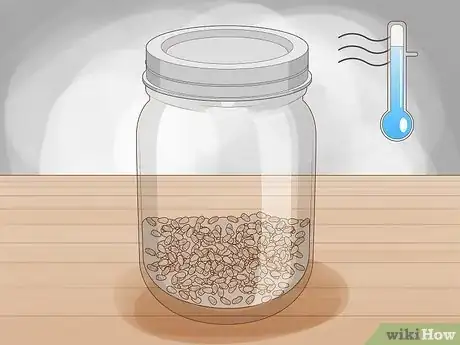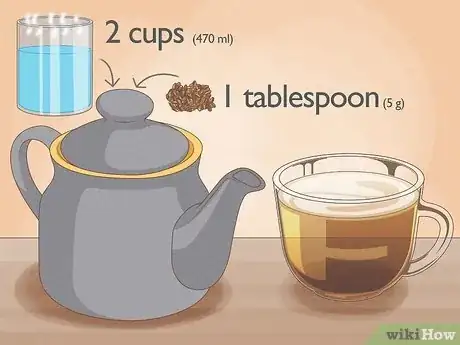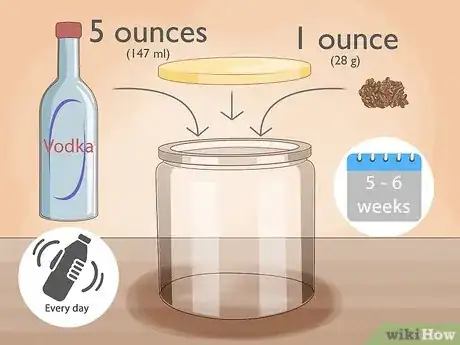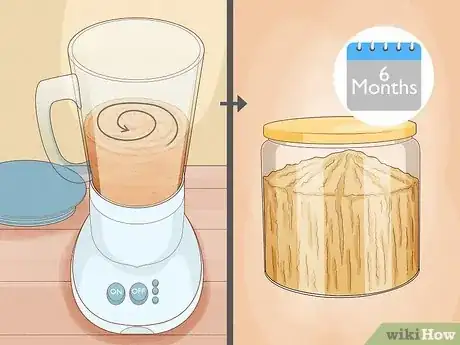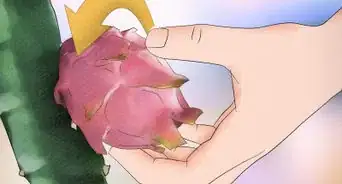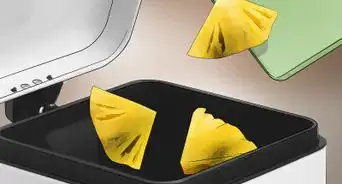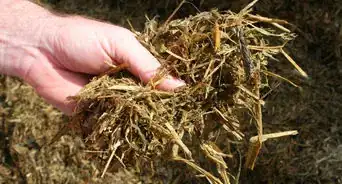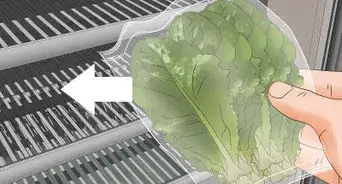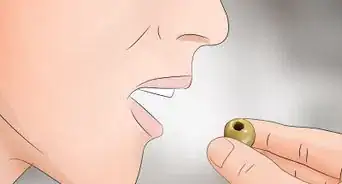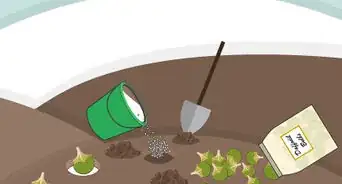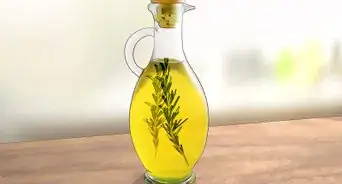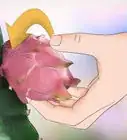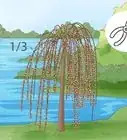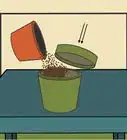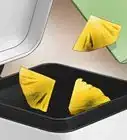This article was co-authored by wikiHow staff writer, Jessica Gibson. Jessica Gibson is a Writer and Editor who's been with wikiHow since 2014. After completing a year of art studies at the Emily Carr University in Vancouver, she graduated from Columbia College with a BA in History. Jessica also completed an MA in History from The University of Oregon in 2013.
This article has been viewed 46,372 times.
Learn more...
If you've stumbled onto a patch of milk thistle growing in rocky soil, grab your gloves and pruning shears. Once the purple heads have begun to turn white and fluffy, cut them from the stalk. Let the heads dry completely in a paper bag and loosen the seeds. Transfer the seeds to a storage container so the chaff floats away. Then you're ready to use the milk thistle seeds in homeopathic preparations.
Steps
Gathering Milk Thistle
-
1Plan to harvest the milk thistle in the fall. Pay attention to when the flowers start to dry out. In the fall you should begin to see white or silver seeds appear near the tops of the milk thistle.[1]
- To make it easier to harvest, wait until the milk thistle blossoms are dry.
-
2Put on protective clothing and gloves. Since the leaves and spines of the plant are sharp and prickly, wear long sleeves and pants that will protect your skin. Wear thick, sturdy gloves that will keep the prickles from poking you.[2]
- Keep in mind that milk thistle can still penetrate the gloves if you don't handle the plant carefully.
Advertisement -
3Cut the head of the milk thistle from the stalk. Take sharp scissors or pruning shears and cut the head. Leave about 2 in (5 cm) of the stalk so it's easier to hold the milk thistle.[3]
- Harvest as many milk thistle heads as you like.
-
4Put the heads in a paper bag and dry them for 5 to 7 days. To harvest the milk thistle seeds, place all of the heads in a paper bag and put it in a warm place. This will help the seeds dry completely.[4]
- For example, put the bag of milk thistle heads in your garage or a room in your house that gets lots of sunshine and warmth.
-
5Separate the seeds from the chaff. Once the seeds are dry, transfer them to a burlap or rough canvas sack. Shake the bag and push down a little so the seeds loosen from the heads. Then pour the seeds from the sack into a bucket or bowl.[5]
- You'll see the chaff blow away from the seeds as you pour them into the bucket or storage container.
-
6Store the seeds in an airtight container. Transfer the seeds to an airtight storage container and put it in a cool, dry place. Plan on harvesting about 1 tablespoon (5 g) of seeds for each milk thistle head you gathered.[6]
- If stored properly, you can keep the seeds for up to 1 year.
Using the Harvested Milk Thistle
-
1Brew tea to enjoy the antioxidant and anti-inflammatory properties. Scoop 1 tablespoon (5 g) of ground milk thistle seeds into a tea bag or filter and put it in a tea pot. Pour 2 cups (470 ml) of boiling water into the pot and let the tea steep for 3 to 5 minutes. Take the tea bag out and sip the tea slowly.[7]
- To flavor the tea, consider adding lemon or honey.
-
2Make a tincture to mix into lotions, salves, or bath salts. Measure 5 ounces (147 ml) of alcohol that's at least 100-proof into a glass container. Add 1 ounce (28 g) of harvested milk thistle seeds and screw a lid on the container. Shake the container every day and let the tincture rest for at least 5 to 6 weeks. Strain the tincture before you're ready to use it.[8]
- Store the tincture for several years in a dark container with a dropper.
- To take the tincture by mouth, squeeze 1 to 2 drops onto your tongue 2 to 4 times a day.
-
3Grind the seeds into a powder for liver pain. Place your seeds into a blender or food processor and put the lid on. Pulse the seeds until they're ground into a fine powder. Store the powder in an airtight container for up to 6 months.
- To use the powder, mix 2 to 3 tablespoons (16 to 24 g) into a smoothie.
Community Q&A
-
QuestionCan I use the leaves of the Milk Thistle?
 ChrisTop AnswererYes, you can use the leaves of this plant to make a milder version of the tea made with seeds. You have to be extra careful when harvesting the leaves, as they are more prickly than the flowers are.
ChrisTop AnswererYes, you can use the leaves of this plant to make a milder version of the tea made with seeds. You have to be extra careful when harvesting the leaves, as they are more prickly than the flowers are. -
QuestionWill the plant reflower after harvesting or do I need to plant new seeds?
 IdabelleCommunity AnswerYou will have to plant more seeds. Milk thistle is an annual plant, so the plant will not flower again next year. However, it is easy to gather seeds from it at the end of its season, which can be replanted for the next growing season.
IdabelleCommunity AnswerYou will have to plant more seeds. Milk thistle is an annual plant, so the plant will not flower again next year. However, it is easy to gather seeds from it at the end of its season, which can be replanted for the next growing season.
Warnings
- Always ask your doctor before supplementing with milk thistle tea.⧼thumbs_response⧽
- If you're allergic to ragweed, you may also be allergic to milk thistle.⧼thumbs_response⧽
Things You'll Need
Gathering Milk Thistle
- Protective clothing
- Gardening gloves
- Scissors or pruning shears
- Burlap or rough canvas sack
- Paper bag
Using the Harvested Milk Thistle
- Tea bag or filter
- Tea pot
- Kettle
- Measuring cups and spoons
- Blender or food processor
- Storage container
- Dark container with dropper
- Glass container with lid
- Strainer
References
- ↑ http://www.naturallivingideas.com/milk-thistle-benefits/
- ↑ http://www.naturallivingideas.com/milk-thistle-benefits/
- ↑ http://www.naturallivingideas.com/milk-thistle-benefits/
- ↑ http://www.naturallivingideas.com/milk-thistle-benefits/
- ↑ http://www.naturallivingideas.com/milk-thistle-benefits/
- ↑ http://littlehouseinthesuburbs.com/2015/06/how-to-harvest-milk-thistle-seeds.html
- ↑ https://www.organicfacts.net/health-benefits/herbs-and-spices/milk-thistle-tea.html
- ↑ http://www.susunweed.com/herbal_ezine/June06/anti-cancer.htm
